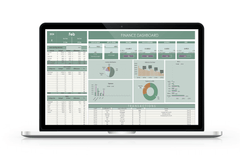In a world driven by consumerism, it’s easy to get caught up in spending without truly thinking about how it aligns with your life goals and values. Mindful money management offers a way to break free from automatic spending patterns by encouraging intentional, value-driven financial decisions. It’s not just about creating a budget—it’s about making each dollar reflect what’s most important to you.
What is Mindful Money Management?
Mindful money management is the practice of being fully aware of where and how you spend your money, and ensuring that your financial decisions align with your values. It's about taking the time to pause and ask yourself whether a purchase supports your larger goals, or if it's simply an emotional or impulse buy.
When you manage money mindfully, you aren't just focused on the numbers; you're focused on purpose. Are you saving for your long-term financial security? Or are you spending on things that bring only temporary satisfaction?
How to Identify Your Core Values
Before you can align your spending with your values, you need to clearly define what those values are. Start by asking yourself:
- What makes me happy and fulfilled?
- What are my top priorities in life?
- What are my long-term goals (financial and otherwise)?
For example, if you value experiences over material possessions, you might decide to allocate more of your budget toward travel or family activities rather than clothes or gadgets. Identifying your core values is the first step in creating a financial plan that aligns with your authentic self.
Steps to Align Your Spending with Your Values
Once you've identified your values, follow these steps to make sure your spending reflects them:
1. Track Your Current Spending
Start by tracking your spending habits for a month. Write down every purchase, no matter how small, and categorize them. This will give you a clear picture of where your money is currently going. Once you have a clear understanding of your spending patterns, you can evaluate whether these expenses align with your values.
2. Evaluate Your Purchases
After tracking your spending, assess each category. Are you spending a lot on things that don’t really matter to you? For example, if you value health and fitness but notice you're spending more on takeout and entertainment, you may want to adjust your budget to allocate more toward healthy food and gym memberships.
3. Create a Value-Based Budget
With a better understanding of where your money is going, you can create a budget that reflects your values. Begin by directing more money toward things that align with your core beliefs and goals, and cut back on areas that don’t. If financial security is a priority, you may want to increase savings or investments.
4. Practice Conscious Spending
Before making a purchase, pause and ask yourself whether it aligns with your values. If it doesn't, reconsider the purchase. This small habit of pausing can help you avoid impulsive decisions and make thoughtful financial choices that bring you closer to your goals.
5. Adjust Regularly
Life changes, and so do your values. Review your spending habits and budget regularly to ensure they still align with your evolving goals. Perhaps a new value emerges, or a financial priority shifts—being flexible is key to long-term financial success.
Benefits of Mindful Money Management
1. Increased Financial Satisfaction
When your spending is aligned with your values, you’ll experience greater financial satisfaction. You’ll feel better about where your money is going because you know it’s supporting what truly matters.
2. Reduced Financial Stress
Spending intentionally means fewer impulse purchases and less financial regret. By cutting out unaligned purchases, you can reduce debt and avoid living paycheck to paycheck, which ultimately reduces financial stress.
3. Achieving Long-Term Goals
Mindful money management isn’t just about the present; it’s about securing your future. Aligning your spending with long-term goals like buying a home, traveling, or early retirement ensures that your daily decisions are propelling you toward financial independence.
Mindful Spending in Everyday Life
Here are a few practical examples of how mindful money management might look in everyday situations:
-
Shopping for Clothes: Before buying a new outfit, ask yourself: Do I need this, or is it just something I want right now? Does it align with my value of sustainability? Am I spending within my budget?
-
Dining Out: If you find yourself dining out multiple times a week, pause to consider whether that habit supports your long-term goals. Would preparing meals at home better align with your values of health and financial security?
-
Entertainment: Consider how much you're spending on entertainment such as concerts, movies, or subscriptions. If spending time with family or personal development is a value, you may want to reduce this category and spend more time on meaningful activities.
Final Thoughts
Mindful money management is about more than budgeting—it’s about aligning your spending with your values and long-term goals. By pausing to reflect on your purchases, you can regain control over your finances, reduce stress, and move closer to financial independence. It’s not about deprivation but about spending intentionally to create a fulfilling and purposeful life.
The next time you reach for your wallet, ask yourself: Does this align with my values? If not, consider redirecting that money toward something that truly matters to you.
